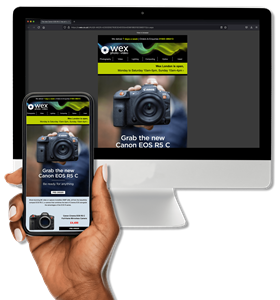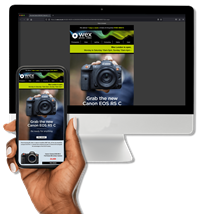
Oscar Lindsey
- Job title: Photographer and TikTok Creator
- Education: Industrial Design and Technology at Brunel University London
- Website: thevisuallife.co.uk
- TikTok: @thevisuallife
- Related jobs: Photographer, content creator, filmmaker, editor, retoucher
Primarily a photographer working with clients such as Bentley Motors, Aston Martin, Sony Xperia, and Adobe, Oscar has also been featured on BBC Travel, BBC Britain, Top Gear, Lensbible and Samsung USA.
A big part of his career has been making short-form TikTok videos. At the time of writing this article, Oscar has amassed a huge 442.3K followers and 6.4M likes sharing inspirational photography tips and tricks, demonstrating shooting and editing techniques, and talking about kit.
TikTok has become a significant part of everyday internet culture and is an incredibly powerful, communicative tool. I spoke to Oscar to ask him about his photography journey, his success on TikTok, and how TikTok has pushed forward his career.
Leo White: What was your inspiration to become a photographer?
Oscar Lindsey: When I went to university to study design, photography wasn’t on my radar. I began losing my passion for the industry I was studying; we had a project that then involved photography. We were able to use the University’s media centre to borrow cameras to assist us, and having used the cameras on offer, I became passionate about how I could capture the world.
That led me down a path of experimentation; I would hire out cameras as often as they’d let me. This was made all the more exciting when I started learning how to shoot manually.
LW: What was your first role in the industry?
OL: I created my Instagram, later followed by TikTok, and used these platforms to build a portfolio. I was posting a lot and dedicated all my free time to shooting and sharing what I’d taken.
My first career breakthrough came off the back of this with a TikTok campaign for Vauxhall. They planned a campaign to showcase their cars under the guise of a photography tutorial. Having seen my work, they hired me to create TikTok content documenting my process of photographing cars and allowed me creative freedom using a range of props and lighting. They wanted me to demonstrate how I captured the photos, the techniques I used and how you can be creative lighting modifiers and props.
Whilst the work reassured me that I had potential in the industry, it caused a slight dilemma. I was enjoying photography and being hired for jobs but finding myself less interested in my degree. While I was finding myself disinterested, I was in a wholly creative space. I was surrounded by like-minded people, becoming skilled with the Adobe suite and was afforded complete artistic freedom.
Watch on TikTok
LW: How did your interest in making content first arise?
OL: Before TikTok, I started on Instagram. I used the platform to demonstrate my techniques and images. After that, I began sharing longer-form videos showing behind-the-scenes from the photos I was taking on YouTube.
Learning how to demonstrate photographic processes and editing those videos made it easier to transition to a short-form medium once TikTok arrived. I learned to pinpoint the key moments of those longer-form videos and shorten them to suit the new platforms.
LW: Why do you think these types of educational videos work on TikTok?
OL: This platform has become the most successful way to demonstrate my skills, especially camera techniques. Because of the short format, one can get straight to the point, and in the time it would take to watch one video on YouTube, you can watch 25 TikToks; remove the filler information, and you can learn faster.
LW: What is it about TikTok that excites you and keeps you going? How different is it from other forms of work that you’ve made?
OL: During the pandemic, I solely focused it - I was creating and sharing videos on an almost daily basis. Because of the restrictions we were under, I was forced to get creative with what I had at home. Naturally, as the lockdowns were lifted and I was able to get out and shoot elsewhere, I posted less. However, there’s still a very real drive to produce TikTok content because it can go viral for any reason. One of the most important things about TikTok is the more videos you put out, the more chances you have one going viral. Keeping up a regular flow of content will ultimately result in more visibility and potential for viral exposure.
For my photographic practice and from experience with the platform, it doesn’t require too much effort to create TikTok content in conjunction with my paid photography jobs. It just takes a conscious mind to consider opportunities; perhaps seeing the technique of how I am taking the photo would be useful for aspiring photographers who don’t know how to achieve a similar effect.
Watch on TikTok
LW: Can it be a sustainable job? Or should it sit side by side with your practice?
OL: If you’re passionate about creating content, you will do it and share regardless. If you’re only doing it because you feel like you have to, the quality of the videos is likely to decline and you’ll likely become disinterested in it.
Equally, it isn’t something that you’ll easily make your full-time job straight away. You have to be consistent and build a large following. This allows you more leverage with brands and will bring about more jobs. I believe it should sit side-by-side with your primary creative outlet. For me, my photography is what enables me to make successful TikTok content.
LW: How do you make money on TikTok?
OL: This has to be split into two sections.
For the organic TikTok content, you shouldn’t go in expecting to make a living straight away. Realistically, I have made very little from TikTok itself. What money is made from it is simply a bonus to the main form of creative work I am paid for.
Generally, money is made on TikTok via branded content. We talked about using TikTok side-by-side with your practice and this is a prime example of that. You may be asked to create content for a brand's page or you be paid to promote a product on your page - this is where having a large following pays off.
For the former, you will typically charge a day rate that covers the time and effort taken to make the content that they will then post on their page. In addition, I learned later that there are areas where you can charge for additional privileges such as exclusivity. If a brand wants to work with you and doesn’t want you to work with anyone else, you can charge an exclusivity rate on a monthly or even yearly basis.
There are also usage rights. A brand may use a piece of content for a select period and you can charge a fee for every month. That can be extended to a lifetime usage where they can buy the video from you outright.
Finally, you can charge a higher rate depending on the number of followers you have. The higher number of followers you have, the wider reach of the promoted product and therefore, you can charge for that exposure.
LW: Could you talk about a challenging moment in your career; perhaps a time when things weren’t working out for you? How did you overcome that?
OL: After university when I felt some imposter syndrome. I felt unqualified for certain jobs or felt out of place when I was shooting with other photographers. Even today when in unfamiliar situations or doing specific jobs for bigger clients and campaigns there’s some anxiety.
What I’ve learned is that the more time you put into it, the more you get out of it. I got to a point where I was comfortable with the quality of work I was producing and didn’t need validation from others.
Photography can seem isolating. That being said, there are big communities on social media, and shooting with friends can help boost your confidence.
Despite what some say, I’ve always told myself to take any opportunity that comes up because the experience is always more valuable than not doing it. When starting out, I used the jobs I was offered as an opportunity to learn and build my skills as a photographer. Throwing myself in and learning from my mistakes helped me become a better photographer.
LW: Is there a notable moment when you knew this was going to be a career for you?
OL: I’m extremely proud of an image I took of Oxford Street. I have fond memories of walking through an empty Oxford Street at the height of the pandemic. While it may not be my best photo, I don’t feel that I’ve taken one I feel as strongly about since.
I also have my branded Lightroom Presets. For the first two years of my career, I had been editing each photo from scratch and the idea of using a preset felt strange. But having spoken to some peers who had made their own presets, I thought I’d explore the idea. It took months and months of work to create but I feel very proud to have my own professional product available for others to use.
Finally, I don’t take it for granted that I have been fortunate in my career and I am proud of the clients I have worked with. Two that stand out for me have been working with Sony for their Xperia campaigns and producing promotional content for the NFL. Both are global brands with a huge audience. I feel proud to have been part of both and each has provided me with memorable experiences and lessons I will take with me throughout my career.
LW: What are your three top tips for aspiring content creators?
- Keep taking photos. Whether it’s using your camera or your smartphone, just keep taking photos and experiment with different styles and techniques.
- Consider all jobs as an opportunity to learn more about your camera, new techniques and how to work with people or clients.
- Don’t ignore your passion. Do what drives you and what makes you happy. Despite the issues I had while at University and the dilemmas I faced; it’s only now that I can make sense of why what I learned at University was relevant and how it has benefitted my career.
About the Author
Leo White has been a member of the Wex Photo Video team since 2018, working in a variety of roles ranging from the contact centre to the product setup team. With both a photography BA and MA, Leo has a wealth of knowledge he's ready to share.




